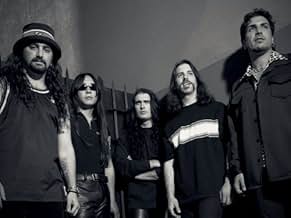Metal Evolution
- TV Series
- 2011–2014
IMDb RATING
8.4/10
2.8K
YOUR RATING
A journey through heavy metal's roots and evolution, featuring interviews with rock legends and industry insiders. Myths are challenged as the genre's depth and impact are revealed through c... Read allA journey through heavy metal's roots and evolution, featuring interviews with rock legends and industry insiders. Myths are challenged as the genre's depth and impact are revealed through candid talks with stars from iconic bands.A journey through heavy metal's roots and evolution, featuring interviews with rock legends and industry insiders. Myths are challenged as the genre's depth and impact are revealed through candid talks with stars from iconic bands.
- Awards
- 1 nomination total
Browse episodes
Featured reviews
I thought the show was interesting and am sometimes shocked at how some of the performers, such as Metallica and Slayer, seem to be oh so very human during their interviews. The origins of metal, according to the show, developed during the Elvis Presley era. Which, I think is a bit far fetched. To me, the first heavy metal song was Helter Skelter by the Beatles. I also never considered bands like Nirvana and Pearl Jam having anything to do with metal. I always considered them more on the lines of punk rock. I thought the documentary was well done. Bringing up bands like Blue Cheer was great, because I had always thought they never got their due. All in all, it's still Rock and Roll to me.
This is just a general overview of the entire series. The 1000-word limit makes it near-impossible for me to cover all 11 episodes in a satisfactory manner. So, if you have nothing better to do, look up my reviews on the individual episodes to get a more detailed appraisal of Dunn's ambitious little project.
Sam Dunn. The best thing about him is his short name; it doesn't take a long time to write. I have issues though with the way he presents the development of metal and its branches. A typical Sociology Major, Dunn thinks that human environment is at the root of EVERY change, whether in music or generally. Hence this naive/deluded need to over-focus on "teen angst" and "alienated youth rebellion". Well, "angry teens" had existed 50 years ago, too, 5000 years ago; they were always around. Metal developed only recently mainly due to technology: it's that simple. But Sociologists are notorious for talking about the bleedin'-obvious - as well as missing the bloody obvious.
The episodes are too short. 45 minutes isn't enough to cover any of these branches – not even the awful ones such as nu-metal and power metal. However, that probably wasn't Dunn's fault; I assume it's the time-framework within which he had to work. He is to blame though for wasting some of that precious limited screen-time by inserting interviews with quasi-experts/outsiders who have either nothing interesting to say or who can't even get basic facts straight.
For example, interviewing a Marxist college-professor who actually argued that Metallica sold out on the "black album" because they recorded ballads for it. Never did it occur to her to actually PLAY their albums; that way she would've learned that Metallica had recorded ballads on three previous albums. In the same episode, an author of a book ironically titled "Extreme Metal" tells us in all seriousness that "death metal completely abandoned all melodies". So how does that help in making me believe that he is a go-to person for extreme metal? Farcical.
Dunn's over-zealousness to lend the series "credibility"/seriousness – by interviewing pseudo-intellectuals (i.e. those who conned him into believing they were part of the "all-knowing", highly analytical intelligentsia) who know next-to-nothing about metal but act as if they have all the answers – is annoying. Contrary to popular opinion, there actually are intelligent, knowledgeable, and fascinating characters in the metal scene itself: there is NEVER need for metal documentary-makers to go for "outside help" in explaining the genre. 1: most metal fans don't want to listen to these attention-seeking "experts" with their long-winded, far-fetched and nebulous theories on metal's "social relevance". 2: the uninitiated will be mislead by listening to so-called "experts" who prefer to let their imaginations run wild, making up nonsense about the meaning/origins of metal, as opposed to looking at the genre in a realistic, down-to-Earth manner. Besides, I'd rather hear about it from the horse's mouth than listen to the views of people who obtained most of their limited knowledge second-hand or even third-hand.
The most irritating aspect of the series is metal's oft-touted "socio-political relevance". There are even some fools who claim that metal was created by youths reacting against the status quo, the so-called "Establishment" (i.e. the same society that enabled their freedom to explore music in such an adventurous manner in the first place) – and we all know what is really meant by this: kids from the "proletariat" rejecting the vicious, "decadent" Capitalism that oppressed them so; a romantic notion, but far-removed from the truth. Besides, it is mind-bogglingly hypocritical that these Western Communists actually suggest that metal kids look toward Marxism as some sort of "bastion of hope and freedom"; in those countries metal-heads usually had a hard time even finding/buying metal albums, let alone being able to pursue careers with their own bands. Socialism as the "Great Youth Liberator"? You've got to be kidding me.
The emergence of metal and its subsequent and speedy evolution had mainly to do with the huge/rapid leaps in music equipment. Or would anyone suggest that metal could have just as easily started in the early 1900s? Before Christ? The reason why it became increasingly heavier, with thrash starting off a long chain of extreme sub-genres, is the technology: continually improving guitars/amps/pedals. Without an improvement in the gear since the early 70s there would have been most likely no thrash, and certainly no industrial or death metal, both of which heavily rely on high-quality productions/sounds to avoid sounding like unlistenable noise. (Pop fans might beg to differ.) Especially thrash had little to do with "alienation" or any such baloney which left-wing rock analysts want to believe in so very much because that would back up their own misogynist worldview.
Metal bands – those few that are overtly political - may generally tend to lean toward left-wing politics (as nearly all forms of rock), but there are too many non-liberal – key – figures in metal for Marxists to be able to claim metal as the natural extension of their decadent ideology, or to be able to misuse metal as an extended arm of their powerful world-wide media propaganda. Alice Cooper, Lemmy, Hetfield, Nugent, Peart, Simmons, Kerry King, Pete Steele, Mustaine: just some of the big names that are well-known for not being liberals.
I am disappointed at how Dunn managed to omit some key bands in certain episodes. His coverage of thrash was quite solid (you can't make a bad episode about it if you tried), but even there he blundered by omitting Venom, Voivod (wearing their T-shirt doesn't cut it), the German trio, SYL, Machine Head and Grip Inc, while actually wasting the viewer's time with later mediocre garbage such as In Flames, At the Gates, etc.
Given its flaws, such as the superficiality that stems from overly compressed/crammed info, the series is of more use to those clueless about metal than to fans.
Sam Dunn. The best thing about him is his short name; it doesn't take a long time to write. I have issues though with the way he presents the development of metal and its branches. A typical Sociology Major, Dunn thinks that human environment is at the root of EVERY change, whether in music or generally. Hence this naive/deluded need to over-focus on "teen angst" and "alienated youth rebellion". Well, "angry teens" had existed 50 years ago, too, 5000 years ago; they were always around. Metal developed only recently mainly due to technology: it's that simple. But Sociologists are notorious for talking about the bleedin'-obvious - as well as missing the bloody obvious.
The episodes are too short. 45 minutes isn't enough to cover any of these branches – not even the awful ones such as nu-metal and power metal. However, that probably wasn't Dunn's fault; I assume it's the time-framework within which he had to work. He is to blame though for wasting some of that precious limited screen-time by inserting interviews with quasi-experts/outsiders who have either nothing interesting to say or who can't even get basic facts straight.
For example, interviewing a Marxist college-professor who actually argued that Metallica sold out on the "black album" because they recorded ballads for it. Never did it occur to her to actually PLAY their albums; that way she would've learned that Metallica had recorded ballads on three previous albums. In the same episode, an author of a book ironically titled "Extreme Metal" tells us in all seriousness that "death metal completely abandoned all melodies". So how does that help in making me believe that he is a go-to person for extreme metal? Farcical.
Dunn's over-zealousness to lend the series "credibility"/seriousness – by interviewing pseudo-intellectuals (i.e. those who conned him into believing they were part of the "all-knowing", highly analytical intelligentsia) who know next-to-nothing about metal but act as if they have all the answers – is annoying. Contrary to popular opinion, there actually are intelligent, knowledgeable, and fascinating characters in the metal scene itself: there is NEVER need for metal documentary-makers to go for "outside help" in explaining the genre. 1: most metal fans don't want to listen to these attention-seeking "experts" with their long-winded, far-fetched and nebulous theories on metal's "social relevance". 2: the uninitiated will be mislead by listening to so-called "experts" who prefer to let their imaginations run wild, making up nonsense about the meaning/origins of metal, as opposed to looking at the genre in a realistic, down-to-Earth manner. Besides, I'd rather hear about it from the horse's mouth than listen to the views of people who obtained most of their limited knowledge second-hand or even third-hand.
The most irritating aspect of the series is metal's oft-touted "socio-political relevance". There are even some fools who claim that metal was created by youths reacting against the status quo, the so-called "Establishment" (i.e. the same society that enabled their freedom to explore music in such an adventurous manner in the first place) – and we all know what is really meant by this: kids from the "proletariat" rejecting the vicious, "decadent" Capitalism that oppressed them so; a romantic notion, but far-removed from the truth. Besides, it is mind-bogglingly hypocritical that these Western Communists actually suggest that metal kids look toward Marxism as some sort of "bastion of hope and freedom"; in those countries metal-heads usually had a hard time even finding/buying metal albums, let alone being able to pursue careers with their own bands. Socialism as the "Great Youth Liberator"? You've got to be kidding me.
The emergence of metal and its subsequent and speedy evolution had mainly to do with the huge/rapid leaps in music equipment. Or would anyone suggest that metal could have just as easily started in the early 1900s? Before Christ? The reason why it became increasingly heavier, with thrash starting off a long chain of extreme sub-genres, is the technology: continually improving guitars/amps/pedals. Without an improvement in the gear since the early 70s there would have been most likely no thrash, and certainly no industrial or death metal, both of which heavily rely on high-quality productions/sounds to avoid sounding like unlistenable noise. (Pop fans might beg to differ.) Especially thrash had little to do with "alienation" or any such baloney which left-wing rock analysts want to believe in so very much because that would back up their own misogynist worldview.
Metal bands – those few that are overtly political - may generally tend to lean toward left-wing politics (as nearly all forms of rock), but there are too many non-liberal – key – figures in metal for Marxists to be able to claim metal as the natural extension of their decadent ideology, or to be able to misuse metal as an extended arm of their powerful world-wide media propaganda. Alice Cooper, Lemmy, Hetfield, Nugent, Peart, Simmons, Kerry King, Pete Steele, Mustaine: just some of the big names that are well-known for not being liberals.
I am disappointed at how Dunn managed to omit some key bands in certain episodes. His coverage of thrash was quite solid (you can't make a bad episode about it if you tried), but even there he blundered by omitting Venom, Voivod (wearing their T-shirt doesn't cut it), the German trio, SYL, Machine Head and Grip Inc, while actually wasting the viewer's time with later mediocre garbage such as In Flames, At the Gates, etc.
Given its flaws, such as the superficiality that stems from overly compressed/crammed info, the series is of more use to those clueless about metal than to fans.
For an old metalhead, this is an interesting show for people who liked the Headbangers Journey video. The disingenuousness shows up when you're reminded that Sam Dunn created his own "family tree" and is basically indulging himself with this show. He's practically begging the grunge bands to declare themselves "metal" and I'm sitting here going, who cares? LOL. I guess as an anthropologist Sam Dunn is naturally predisposed to dissect his obsessions like this, but he needs something else to do. A Rush-style biography of Scorpions or Sabbath would be good.
Put simply - to date (2022) this is the best heavy metal music documentary. The author really tried hard to explore the origins of nearly every subgenre and the genre as a whole and the directions it is heading. Plenty of metal legends interviews, everything is greatly structured, great camera work and great editing.
My only remarks are these: the company behind the documentary seems to explore North America and UK music only and fails to understand what is really going on when it goes East of UK. This applies both to "Metal Evolution" and "This is Pop" which is now on Netflix. So speaking of North America and UK everything is fine, everything is explained in great detail and well structured. But once they go to the actual part of Europe is where things go bad, because both movies show lack of proper understanding of both the European music roots and the European music culture. To be honest I will credit only these two documentaries, as these two are the only ones I have seen entirely. So far I started "Hip Hop Evolution", but I am still not past Season 1 Episode 4, so will refrain from commenting this one.
As for "Metal Evolution", there are basically few weak points. First thing I noticed was also lack of enought attention towards Sepultura. Sepultura was iconic superstar band in the trash era and they barely mentioned it. Sure, they used "trash legends" when mentioned it and there was a short interview with Max Cavalera, but that was it. There was nothing about the innovative solo sound which Andreas Kisser tried to do either. But Sepultura is a Brasilian band. So maybe Banger Films fail to properly understand everything which is outside North America and UK, not just Europe.
I don't think there was enough depth shown for the death metal genre either. Also while not a metal band, I think Red Hot Chilli Peppers deserved a proper mentioning in the grunge episode.
One other thing missing was mentioning the Goth metal genre and the industrial genre. However I assume there was not enough budget for these. Still - goth metal was huge in the mid 90s to the mid 2000s approximatelly, pioneered by the legendary Paradise Lost and this band was more than deserving to be shown. Speaking of industrial, this could be a huge topic, but mentioning at least Front 242, Ministry and KMFDM was needed.
One serious flaw I noticed was the power metal episode. Dude, how is it possible you did not properly understood what power metal is about ?? Sure, there was some imagery with bands like Manowar, but hell the power metal (and the speed metal and so on) was never about that! Helloween (respectively Gamma Ray), Blind Guardian and the rest - these are first and foremost about musicianship - all of them are amazing musicians. The hell - listen to some covers they did - everything is amazing, the same way as once a friend of mine could not differentiate Dream Theater doing a Kansas song cover. In the case of Blind Guardian for example or Gamma Ray - the covers they do are signed with a signature tones, very distinguishable. So first and foremost as I said - this metal is about being a great musician. Then the litemotif of the entire genre is the narrative - it is not just the European folklore, yes it started there, but it could be anything - it is all about a well told story. Yes - storytelling!! Expanding the J. R. R. Tolkien narrative with some new ornaments, adding a brush stroke on the Dune universe ("Traveler in Time" -Blind Guardian) or Stephen King (again Guardian) or praising the pirate adventures (Running Wild) or the good times of Nightwish with Tarja and the stories they have told! Why do you think we all listen to this music - it inspires us to dream with the stories they tell and this is exactly why bands like Blind Guardian put bard pictures on their covers, because it is all about storytelling! It may started with Rainbow and R. J. Dio continued in albums like "Holy Diver", but it lives on! For the sake of everything, the catchy melodies come in the very end of the whole thing!! Stick this in your pipe and smoke it once and for all!!
I also noticed there was nothing about the symphonic metal genre, which evolved out of the power metal to me and was and I guess to a degree is still a huge hit in Europe. But for example the super-famous album "Theli" of Therion came out in 1996, so no excuse a documentary in 2011 not to mention it. Therion pioneered the genre and lead hordes of Scandinavian bands after them.
No mentioning of the doom metal as well. Bands as Asphyx need a serious mention here.
And there were some experimental bands which also needed few words to be told, like Tiamat for example.
Anyway. I will attribute all this to the lack of budged, except the fail to understand the power metal. Everything else was fine, well researched and well told.
I still recommend watching this in 2022.
My only remarks are these: the company behind the documentary seems to explore North America and UK music only and fails to understand what is really going on when it goes East of UK. This applies both to "Metal Evolution" and "This is Pop" which is now on Netflix. So speaking of North America and UK everything is fine, everything is explained in great detail and well structured. But once they go to the actual part of Europe is where things go bad, because both movies show lack of proper understanding of both the European music roots and the European music culture. To be honest I will credit only these two documentaries, as these two are the only ones I have seen entirely. So far I started "Hip Hop Evolution", but I am still not past Season 1 Episode 4, so will refrain from commenting this one.
As for "Metal Evolution", there are basically few weak points. First thing I noticed was also lack of enought attention towards Sepultura. Sepultura was iconic superstar band in the trash era and they barely mentioned it. Sure, they used "trash legends" when mentioned it and there was a short interview with Max Cavalera, but that was it. There was nothing about the innovative solo sound which Andreas Kisser tried to do either. But Sepultura is a Brasilian band. So maybe Banger Films fail to properly understand everything which is outside North America and UK, not just Europe.
I don't think there was enough depth shown for the death metal genre either. Also while not a metal band, I think Red Hot Chilli Peppers deserved a proper mentioning in the grunge episode.
One other thing missing was mentioning the Goth metal genre and the industrial genre. However I assume there was not enough budget for these. Still - goth metal was huge in the mid 90s to the mid 2000s approximatelly, pioneered by the legendary Paradise Lost and this band was more than deserving to be shown. Speaking of industrial, this could be a huge topic, but mentioning at least Front 242, Ministry and KMFDM was needed.
One serious flaw I noticed was the power metal episode. Dude, how is it possible you did not properly understood what power metal is about ?? Sure, there was some imagery with bands like Manowar, but hell the power metal (and the speed metal and so on) was never about that! Helloween (respectively Gamma Ray), Blind Guardian and the rest - these are first and foremost about musicianship - all of them are amazing musicians. The hell - listen to some covers they did - everything is amazing, the same way as once a friend of mine could not differentiate Dream Theater doing a Kansas song cover. In the case of Blind Guardian for example or Gamma Ray - the covers they do are signed with a signature tones, very distinguishable. So first and foremost as I said - this metal is about being a great musician. Then the litemotif of the entire genre is the narrative - it is not just the European folklore, yes it started there, but it could be anything - it is all about a well told story. Yes - storytelling!! Expanding the J. R. R. Tolkien narrative with some new ornaments, adding a brush stroke on the Dune universe ("Traveler in Time" -Blind Guardian) or Stephen King (again Guardian) or praising the pirate adventures (Running Wild) or the good times of Nightwish with Tarja and the stories they have told! Why do you think we all listen to this music - it inspires us to dream with the stories they tell and this is exactly why bands like Blind Guardian put bard pictures on their covers, because it is all about storytelling! It may started with Rainbow and R. J. Dio continued in albums like "Holy Diver", but it lives on! For the sake of everything, the catchy melodies come in the very end of the whole thing!! Stick this in your pipe and smoke it once and for all!!
I also noticed there was nothing about the symphonic metal genre, which evolved out of the power metal to me and was and I guess to a degree is still a huge hit in Europe. But for example the super-famous album "Theli" of Therion came out in 1996, so no excuse a documentary in 2011 not to mention it. Therion pioneered the genre and lead hordes of Scandinavian bands after them.
No mentioning of the doom metal as well. Bands as Asphyx need a serious mention here.
And there were some experimental bands which also needed few words to be told, like Tiamat for example.
Anyway. I will attribute all this to the lack of budged, except the fail to understand the power metal. Everything else was fine, well researched and well told.
I still recommend watching this in 2022.
If you are a fan of metal in any kind - YOU MUST SEE THIS. However, it is interesting for people that don't even like metal music. My sister is not a fan but, she's almost more into this show than I am. I love metal and I love the fact that this show explores all the different genres. I hate the fact that people that don't like metal think it's all just violence and anger. For some bands it is but, however, there are so many different forms of metal that some people would even be surprised to learn that certain bands are even considered metal. The cool thing about this show is that even if there is a band that I absolutely hate on it, it's equally as interesting and entertaining when there's a band I love. This is one the greatest shows on TV right now and I hope that it can open at least one person's eyes to what metal really is.
Did you know
- How many seasons does Metal Evolution have?Powered by Alexa
Details
- Release date
- Country of origin
- Language
- Also known as
- Hårdrockens historia
- Production company
- See more company credits at IMDbPro
- Color
Contribute to this page
Suggest an edit or add missing content
































